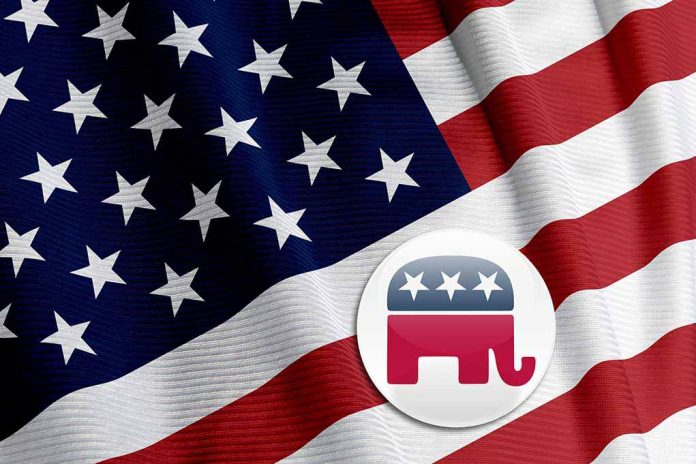
Republican lawmakers are urging the Department of Defense to blacklist a Chinese electric vehicle battery manufacturer with alleged ties to the Chinese Communist Party, citing national security concerns.
At a Glance
- GOP lawmakers push to add Chinese EV battery maker CATL to Pentagon’s blacklist
- Concerns raised over CATL’s alleged ties to CCP and Chinese military
- Lawmakers cite national security risks and potential forced labor practices
- Move could impact U.S. military infrastructure and EV market
Republican Lawmakers Sound Alarm on Chinese Battery Manufacturer
Republican lawmakers are taking a stand against what they perceive as a growing threat to national security. Rep. John Moolenaar and Sen. Marco Rubio have sent a letter to Defense Secretary Lloyd Austin, urging the Department of Defense to blacklist CATL, a Chinese electric vehicle battery manufacturer. The lawmakers claim that CATL is “involved in bolstering Beijing’s military ambitions” and benefits from “subsidies, tax incentives [and] favorable procurement deals” from the Chinese Communist Party (CCP).
The push to add CATL to the Pentagon’s 1260H list, which identifies companies supporting China’s military goals, stems from concerns about the company’s alleged ties to the CCP and the Chinese People’s Liberation Army (PLA). If successful, this action would prevent CATL from receiving U.S. military contracts and potentially impact its operations in the United States.
Republican Lawmakers Push Defense Department To Blacklist Chinese EV Battery Company Tied To CCP https://t.co/uw06oG0PBo via @DailyCaller
— Chris 🇺🇸 (@Chris_1791) August 29, 2024
National Security Implications and Military Concerns
The lawmakers argue that CATL’s presence in the U.S. market poses significant national security risks. They claim that the company’s batteries could enhance the PLA’s infrastructure and potentially expose American military assets to foreign influence. The U.S. military has already taken steps to reduce ties with CATL, including the Marine Corps removing a CATL battery from Camp Lejeune and the Navy committing to only purchase American or allied-supplied batteries.
“U.S. policymakers have a duty to stand in resolute opposition to any effort by America’s adversaries that threatens our national and economic security” Moolenaar and Rubio wrote.
Despite these measures, CATL remains active in the U.S., providing technology for a Ford battery facility in Michigan and developing a battery energy storage system in Texas. This ongoing presence has fueled concerns among lawmakers about the potential for espionage and the compromise of critical industries.
BREAKING: @RepMoolenaar & @SenMarcoRubio call on @SecDef to BLACKLIST Chinese Communist Party-tied EV battery manufacturer @catl_official.
“… It would also send a powerful signal to U.S. companies who are currently weighing partnerships with CATL.” ⬇️https://t.co/trILVo7Iv1 https://t.co/1mqSZYNRV5 pic.twitter.com/f9JyT1Lb8k
— Select Committee on the Chinese Communist Party (@committeeonccp) August 28, 2024
Forced Labor Allegations and Broader Implications
The push to blacklist CATL is not solely based on national security concerns. Republican lawmakers have also raised alarms about potential forced labor practices within the company’s supply chain. Chairman Moolenaar of the House Select Committee on the Chinese Communist Party has stated that they have uncovered “indisputable evidence” linking CATL to forced labor and the ongoing persecution of Uyghurs in China.
“The Select Committee has uncovered indisputable evidence that Gotion High Tech and CATL have supply chains that are deeply connected to forced labor and the ongoing genocide of Uyghurs in China. That is why the Forced Labor Enforcement Task Force must immediately add Gotion High Tech and CATL to the UFLPA Entity List and block the shipments of these companies from entering the United States. The American people expect companies in the U.S. to avoid all involvement with the Chinese Communist Party’s campaign of genocide.” –Chairman Moolenaar
These allegations add another layer of complexity to the situation, as products made with Uyghur forced labor are prohibited from entering the U.S. under the Uyghur Forced Labor Prevention Act (UFLPA). The evidence against CATL includes claims that the company sources materials from entities linked to the Xinjiang Production and Construction Corps (XPCC) and other organizations implicated in forced labor practices.
As the debate over CATL’s presence in the U.S. market continues, the outcome of this push for blacklisting could have far-reaching implications for U.S.-China relations, the electric vehicle industry, and the broader struggle to balance economic interests with national security concerns.
Sources
- Republican Lawmakers Push Defense Department To Blacklist Chinese EV Battery Company Tied To CCP
- House Homeland Republicans Join Chairman Moolenaar in Demanding Immediate Blacklist for Chinese Battery Companies Gotion, CATL Amid Shocking New Evidence of Slave Labor Links
- China hawks push Defense Department to blacklist EV battery-maker
- Moolenaar, Rubio Request DoD Blacklist CCP-Linked Battery Company, CATL
- Congressional China hawks push to blacklist Chinese battery makers






